But if you keep making the same mistakes over and over again, this can be incredibly disheartening.
When it comes to taking tests and exams, there are some common pitfalls students fall into.
Below I share 11 common mistakes students make when it comes to preparing and taking tests/exams – and how you can avoid making them.
Without a doubt, this is where most students go wrong with exams. They don’t give themselves enough time to learn the content properly.
The thing about your brain is that it needs time to digest ideas. You need to revisit ideas for them to stick.
Start preparing for exams when you can still think properly.
Even if one month out from exams you’re just doing 10 minutes of flash card revision each day, that will make a difference. All those little bits of study add up to something really solid.
A little bit of stress is okay and can be motivating. But if you’re struggling to stay focused and feel like bursting into tears, your stress levels are too high! Dial it down.
Start preparing early (see point 1).
Other strategies you can use to decrease exam nerves:
• Use this simple reframe: Think of exams as being just like big tests.
• Power pose before the exam: Strike a boss style pose for 2 minutes.
• Practice visualisation: See yourself taking the exam and walk yourself through the process (from start to finish).
“Be calm and know that you can do this.”
Taking exams is a skill. Whether you go well or not isn’t so much a reflection of your intelligence. It’s more a reflection of your exam technique and how well you can prepare for exams.
Practice doing lots of exams under timed conditions. Treat it like you’re training for a marathon. Perhaps initially you just want to do a 30 minute ‘exam’ workout. As you build your strength and stamina, build it up to 45 minutes, then an hour. Eventually attempt the full 3 hours.
This takes grit and determination. But it will be time well spent.
Distraction is the enemy when it comes to learning. If you want to be able to learn information you need to be able to focus.
Before you start studying, create a focus force field. Put your phone away. Install an Internet blocker app. Get someone to change the password on your social media accounts. If you know you tend to get hungry when you study, set yourself up with some healthy snacks before you get started.
In short, deal with distractions from the outset.
“Put your phone and other distractions away while studying as this will benefit you in the future … however phones will destroy your future.”
The complex terms, jargon and the text heavy nature of your syllabus can make it scary to look at.
But don’t let those things put you off looking at this document.
Your syllabus is too important to ignore.
It will save you hours (possibly even weeks) of time. You just need to know how to navigate through it.
Bypass all the jargon and head straight to the unit content section. This section tells you exactly what you’ll be assessed on.
Then choose a syllabus point and use an effective study strategy to make it stick (see point 6). Aim to cover at least one syllabus point every time you sit down to study.
Reading your books and notes over and over again is not an effective way to prepare for exams. Highlighting your notes isn’t going to help either.
The research shows what feels good and easy when it comes to study rarely is effective.
Make a commitment to learn and use the most effective study strategies out there (you can read about these strategies here).
A little time spent learning effective study strategies will save you so much time later on. You’ll get that time back plus better grades and a more satisfying learning experience.
Entering the exam room in a sleep deprived state is a recipe for disaster. You’ll struggle to recall information. You’ll find it hard to concentrate. You’ll feel fatigued. Probably a little depressed too.
In short, everything is going to feel so much harder.
Make getting 8-10 hours of quality sleep a non-negotiable part of your daily routine. If required, throw in a power nap.
“Sleep the night before. Don’t cram.”
You’re feeling over it by your final exam. You’ve lost all motivation to study. You don’t really care how you go. So you do the bare minimum to prepare for it. You go in with a plan to … wing it. But winging isn’t an effective strategy.
If you’re running out of steam, you need to engage in little activities to recalibrate. What do I mean by this? Do things that will help you feel normal again and restore your energy levels.
One student shared this piece of advice:
“Study early, study late, and somewhere in the middle treat yourself to an $11 Medium meatbox from Kebab Lads. “
Perhaps an $11 meat box isn’t the greatest way to restore your energy levels. But that’s beside the point.
The point is this:
And then hit the books again!
Repeat this process until your final exam is over.
“Don’t get demotivated by the time your last two exams come round. Divide your time and effort well.”
If you keep using the same old study methods (e.g. passively reading), then expect things are going to get a little bit boring at some point.
Apply Fun Theory to you studies. Experiment with different ways to make studying the subject a little more fun and interesting for your brain.
Stress is contagious. If you’re hanging around people who are freaking out about exams (“I’m going to fail!”), don’t be surprised if you start to feel anxious, too.
Keep away from anxious people before your exams so you stay calm and composed.
“Get in, do it, and get out!”
When you don’t read and answer the question properly, it’s like going into an Italian restaurant, ordering a pizza and the waiter serving you a bunch of kale. How would you feel? Slightly frustrated?
This is how the examiner feels when you don’t answer the question properly.
Read the question carefully. As you read the question, look for clue words such as explain, discuss and compare. These words have different meanings. They determine the approach you need to take to answering the question. Some students find it can help to rewrite the question in a way that makes sense to them.
Not sure what the difference is between discuss and explain?
No problem! Use effective study strategies to understand and remember the meaning of each clue word. This will be time well spent.
Which mistakes do you keep making? My advice is this: pick one area to focus on. If you need to get more sleep, then now is the time to establish better sleep habits (e.g. no technology 30 minutes before bed). If you need to learn better study strategies, spend a few hours testing out some different strategies.
It’s amazing how a few simple tweaks to your lifestyle and study habits can dramatically lift your game.
So what are you waiting for? Close this browser and go do something your future self will thank you for!
Share This:

When you start using this strategy, it can feel clunky and awkward. It requires some mental effort to get going.
Why can it feel hard to start mind mapping?
Because it isn’t a habit (not yet, anyway). But once mind mapping becomes a habit, it can feel easy and deeply rewarding.
So, how do you get to that point where mind mapping feels easy? Even fun?
In this article, I will explore how you can create a habit of mind mapping. I’ll show you how to remove friction or pain points so it’s much easier to put pen to paper and absorb ideas.
Let’s start by looking at what gets in the way and stops many people from creating mind maps in the first place. I’ll also share some strategies you can use to overcome each of these barriers.

When you look at a mind map with all the pictures and different colours, it seems like something that would take a fair amount of time and effort to create.
If you’re comparing mind mapping to the time it takes to read your book passively, then yes, mind mapping will take more time. But you need to understand that reading your book passively is not an effective way to learn. In contrast, mind mapping is super effective.
People often fall into the trap of trying to make their mind maps look like works of art. Try lowering your standards and allowing yourself to make a mess when you mind map. This will speed up the process.
Another time trap is trying to mind map as you read and trying to mind map everything you read. I find it’s much faster to read and tab key ideas worth mind mapping later on. Once I’ve finished reading either the chapter or book, I then commence the mind mapping process. By this stage, I have a better understanding of the key ideas and what’s worth mind mapping.
Some people get hung up on the way their mind maps look. They can’t stand looking at messy pictures and scribbled words. If that’s you, perhaps you could take your drawing skills to the next level with some practice and sketch classes. But it’s not necessary.
Mind maps are not there to look pretty. They are there to help you learn. I am a big fan of badly drawn mind maps. If you look at my mind maps from university, they’re not works of art but they contain loads of important ideas. And that’s what matters most when it comes to learning.
Here’s a simple hack: invest in a set of nice, vibrant coloured pens. A bit of colour on the page will make your mind maps more visually appealing.

Mind mapping is straightforward. You draw a central image, curved lines, a few pictures, and write down key ideas. That’s it!
It’s not something you need to read a book about. You don’t need to enrol in a 10 week program to learn how to do this.
If you want some tips on how to mind map, check out my free Mind Mapper’s Toolkit. It’s a quick and easy read.
It’s important to realise that the first time you engage in any new behaviour, it will most likely feel strange and uncomfortable. You may feel a bit clumsy and awkward. You may have questions, “Am I doing this right?”. All of this is normal and to be expected.
Even something as simple as the pen you mind map with can make or break the mind mapping process.
You’ve probably noticed that some pens don’t feel pleasant to write or draw with. For instance, I’m not a fan of the popular Sharpie pen range. I don’t like the way these pens bleed through the page. And I really don’t like the way they smell.
These may seem like minor irritations and quirks, but trust me, they’re not. Your mind mapping experience will be diminished by a pen that doesn’t feel good in your hand or on the page. And any behaviour that feels unpleasant is much harder to sustain.
I’ve since ditched my Sharpie pens. I mind map with a uniball signo pen and non-toxic Tombow paintbrush pens. As far as coloured pens go, I won’t lie, these pens are pricey! But you can find them online for $25 cheaper than in Officeworks (a big stationery store in Australia).
What I love about these pens is that they are super easy to use, feel lovely to strike across the page, and they won’t leave you with a splitting headache from the ink smell.
Here are some things that have helped me to establish this habit in my life:
When is the best time for you to mind map? Where in your day can you easily slot in a 15 minute mind mapping session?
I like to mind map when I feel fresh and mentally alert (first thing in the morning).
Find an activity that you do every day without fail (e.g., having a shower, eating breakfast or dinner) and use that to prompt you to start a mind mapping session.
For instance, after I have completed my morning routine (workout, breakfast and shower), that’s my cue to sit down and start mind mapping.
Before you start your session, set yourself up with everything you need to mind map. I like doing this the night before my morning mind mapping sessions.
Before I go to bed, I lay out a sheet of A3 paper, my pens, and my timer. The book I am mind mapping is open on the page where I need to start working. The next day, all I need to do is sit down, start my timer, pick up a pen, and away I go!

What’s one thing that can slow down the mind mapping process?
For me, it’s digital distractions (e.g., text messages and notifications).
You probably already know the things that tend to derail you. Create a barrier between you and those things.
For example, my phone is the biggest distraction for me. How do I deal with this? Before I start mind mapping, I take my phone and place it away from my body in another room.
This signals to my brain that my phone is off-limits and it’s time to knuckle down and focus on my work.
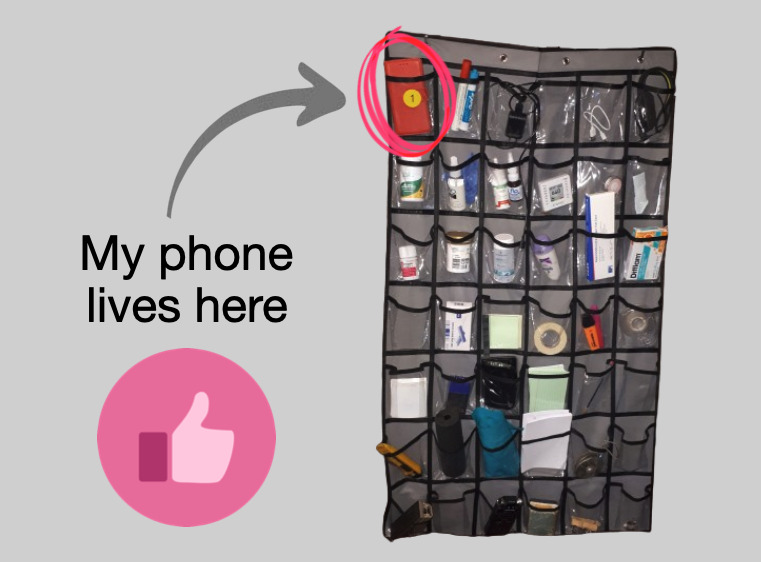
Don’t wait until you feel pumped and inspired to create a mind map. Set a timer for 10-15 minutes and start mind mapping (regardless of how you feel).
If you miss a day, don’t beat yourself up. It’s no big deal. Just say to yourself, “Tomorrow is a new day. I will get back into mind mapping then”.
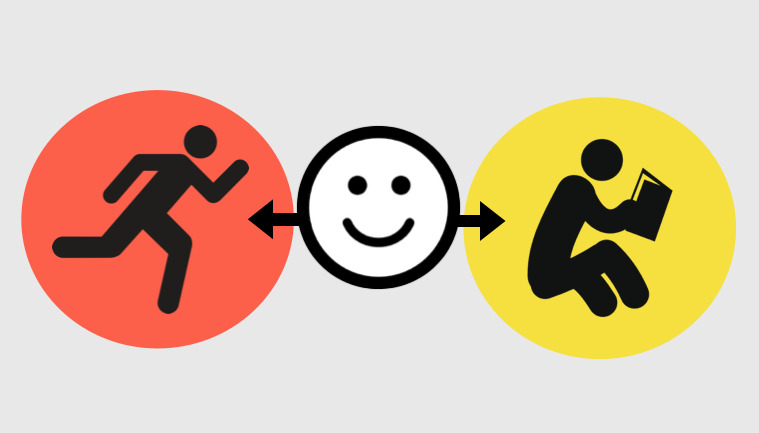
When the timer goes off at the end of your mind mapping session, say to yourself, “Good job!”. Do anything that makes you feel instantly good. I often clap my hands or do a fist pump.
According to Professor BJ Fogg, the secret to wiring in any new habit is to release a positive emotion within milliseconds of engaging in the new behaviour. When you release positive emotions, this releases dopamine in your brain. This makes it more likely that you’ll engage in this behaviour again.

I mentioned this before, but it’s important to repeat it: don’t go cheap with your mind mapping tools. Invest in good pens and paper. My favourite pens for mind mapping are uniball signo pens (0.7 tip) and Tombow paintbrush pens. Regarding paper, I love using Rhodia paper (it feels like your mind mapping on butter).
It may sound a little dramatic, but mind mapping changed my life. I used to read books and then feel frustrated that I couldn’t retain much information. But now, I have a strategy I can easily use to help me understand and remember complex ideas. This gives me confidence when it comes to learning new skills and information.
I encourage you to be playful with this strategy. Don’t get too hung up on how your drawings look. Your top priority is to leave perfectionism at the door and have some fun. Because when it comes to mind mapping, done is better than perfect.
Years ago, I was gifted a treadmill.
Within days of receiving this treadmill, I had converted it into a walking desk. I was super excited by the possibility of walking and working simultaneously (one form of multitasking I’m totally fine with).
I had visions of myself walking and working with supercharged productivity. I thought, “Nothing is going to stop me!”.
But despite my best intentions, I struggled to use this treadmill desk. I couldn’t make walking and working part of my daily routine.
I’m embarrassed to admit that this treadmill just sat there collecting dust for years.
Occasionally, I would hop on the treadmill to practice my presentations (10 minutes here and there), but this was not a solid part of my daily routine like I had hoped it would be.
It wasn’t a lack of information. I was fully aware of the benefits of movement for learning.
I had read dozens of books and research papers that provided solid evidence for the benefits of incorporating movement into the day.
For example, the Stanford university research study called Give your ideas some legs showed that people who walked generated more creative ideas than those who sat.
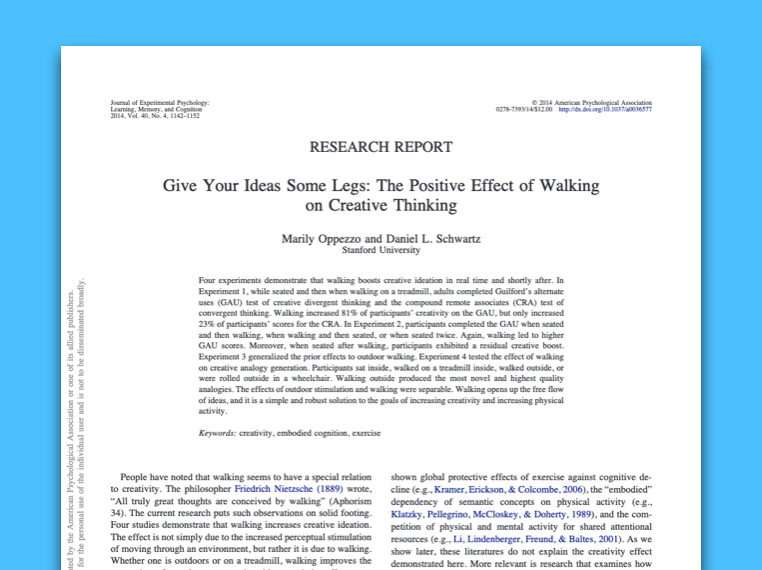
I had also experienced firsthand the powerful benefits of movement: it made me feel better, stronger, and mentally sharper.
Something else was getting in the way.
So, I asked myself what Professor BJ Fogg would call the Discovery Question:
What is making this behaviour (i.e., walking and working at my treadmill desk) hard to do?
In his book Tiny Habits, Behavior Design expert Professor BJ Fogg argues if you’re struggling to engage in a particular behaviour, it will be due to one of five factors: 1) Time, 2) Money, 3) Physical effort, 4) Mental effort, and 5) Routine.
He calls these five factors the Ability Chain.
To pinpoint where you are stuck with adopting a new behaviour, Professor Fogg recommends asking the following questions:
• Do you have enough time to do the behaviour?
• Do you have enough money to do the behaviour?
• Are you physically capable of doing the behaviour?
• Does the behaviour require a lot of creative or mental energy?
• Does the behaviour fit into your current routine, or does it require you to make some adjustments?
Professor Fogg states:
“Your ability chain is only as strong as its weakest Ability Factor link.”
It was the physical effort link.
My problem was that I was walking way too fast on my treadmill, which caused my legs to fatigue quickly.
I also felt uncomfortable having to look down at my small laptop screen.
After asking the discovery question, it became clear why this habit had not stuck: I felt awkward and clumsy using my treadmill desk.
But it also became apparent that I could strengthen this weak link by making simple adjustments.
I then asked myself this question:
What could make using my treadmill desk easier to do?
I brainstormed ways to improve my treadmill desk (How could I make it easier to walk and work simultaneously?). With a bit of experimentation and a playful mindset, I was amazed that after years of this treadmill collecting dust, I was finally using it regularly.
I experienced what author Jenny Blake would call a nonlinear breakthrough (NBL).
In her book Free Time, Blake describes a non-linear breakthrough as “an unexpected sharp turn of clarity or success, rather than a linear, long, or otherwise time-consuming analysis or slog”.

This habit of using my treadmill desk was wired in quickly, easily, and joyfully.
If you’re interested in using a treadmill desk and feeling less exhausted at the end of the day, I recommend trying the following things.

Like any new habit, start small. If you’re used to sitting all day, this transition will take some time. Most people would struggle to go from sitting to walking all day. My advice is to ease into it.
Start by doing mini treadmill work sessions (15-30 minutes or whatever you can manage) and gradually build your way up to longer sessions (1 hour).
In the first couple of weeks of developing this habit, I used my treadmill desk in the morning for 2 to 3 hours and then gave myself permission to use my sit-stand desk in the afternoon.
As I became more confident walking and working, I replaced more sit-stand sessions with treadmill desk sessions. The treadmill desk is now my main workstation and the sit-stand desk is rarely used.

Comfort is king. Anyone who works in a job where they are on their feet all day will tell you that comfortable shoes are an absolute must. Don’t skimp on good shoes.
I went to a sports store and purchased a pair of running shoes that provided excellent support and made my feet feel good all day. I live in these shoes now, and they make walking and working easier and more enjoyable.
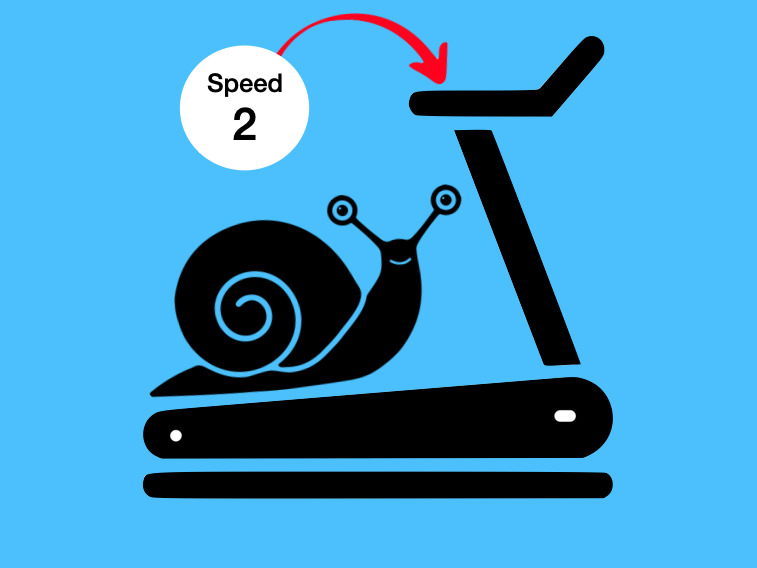
I’m a fast walker. But it’s difficult (and tiring) to walk and work at a fast pace. You can’t sustain that pace all day. It’s also hard to type and focus on your work when power walking.
I read in online forums that professional treadmill desks (not DIY ones like mine) are programmed to go at a slow pace. This is a deliberate design decision. The slow pace is not only for your safety but also so you can sustain the habit of walking and working for a long time.
I’ve had to learn to slow down (not just at my treadmill desk but in all areas of my life). Once I recalibrated to walking at a much slower pace, I could sustain this habit of working in this new way.
Some days, you’re going to have more energy than others. If you’ve been walking for 30 minutes and feel like your legs need a break, give yourself permission to take a break.
Using a treadmill desk shouldn’t feel like a chore. It should be viewed as an activity that makes you feel more alert and energised. Using a treadmill desk (even a budget homemade one) is a privilege!
You need to get the ergonomics right to sustain the habit of using a treadmill desk. In other words, you need to be comfortable at your treadmill desk.
In hindsight, it’s obvious why I wasn’t using my treadmill desk for years: my setup wasn’t the best. I was looking at a tiny laptop screen with my neck craned and moving at a power walker’s pace.
I wasn’t comfortable, which meant I didn’t feel good.
And if you don’t feel good doing something, it’s much harder to sustain a particular behaviour. You may also end up with bigger problems down the track (e.g., bad posture and lower back problems).
A couple of years ago, I attempted to improve the ergonomics of my treadmill desk by placing a sit-stand desk on top of my existing desk. I also propped up a slightly bigger monitor on some books.

This setup turned out to be disappointing. My monitor would shake as I walked on the treadmill. The sit-stand desk also restricted my walking range on the treadmill belt. Again, this setup was far from ideal and the habit of using it didn’t stick.
A few months ago, while researching ways to improve my treadmill desk, I came across forum posts where people shared that they had mounted a monitor to their wall and used it with their treadmill desk. Bingo! Immediately, I knew this was the solution for me.
I jumped on Gumtree and found a secondhand large monitor and monitor bracket. This created more space on my desk for other items (paper, pen, and my stream deck).

Finally, I could say goodbye to terrible posture and squinting at tiny icons on a small laptop screen.
My treadmill desk also doubles as my high-intensity exercise station. Each morning, before I launch into my workday, I warm up my brain by doing a 20-30 minute walk + run to clear my mind and improve my mood.
When I first started doing these morning runs, I noticed whenever I reached high speeds, objects in the cupboard next to the treadmill would shake and sometimes fall off onto the treadmill belt, creating potential trip hazards.
To solve this problem, I got a roll of heavy-duty Bear tape and taped all the boxes to the shelves beside me. It may not look pretty, but it keeps all my items securely in place.
I noticed that as I ran on the treadmill, creative ideas would come to me out of nowhere. I needed a way to capture these ideas.
So, I turned my treadmill desk into a whiteboard. This cost $5. Here’s what I did . . .
I found a roll of whiteboard wallpaper at Officeworks (a big stationery shop in Australia) and covered my desk (an old plank of wood) with it.
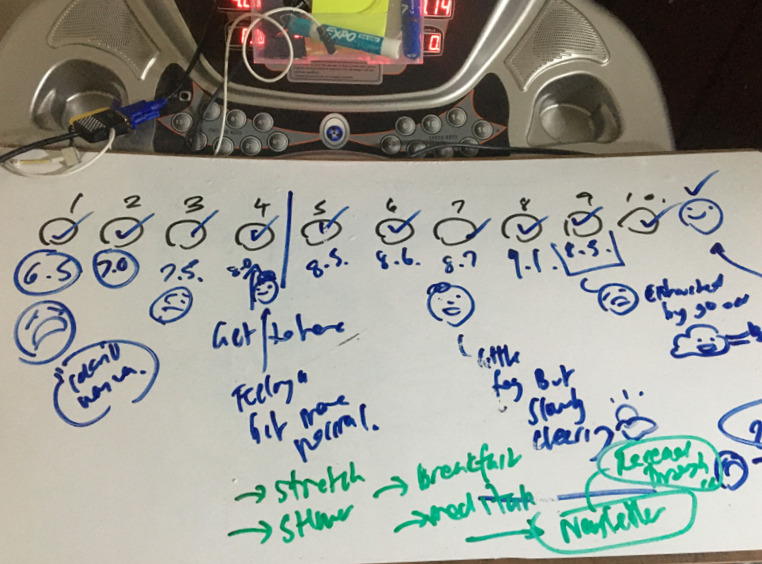
I also attached a plastic container to the treadmill that I found at the tip shop for $1. This container holds whiteboard markers, sticky notes, and pens.
Whenever an idea strikes, I get a whiteboard marker and write it on my desk. At the end of my run, I transfer any good ideas into my notebook.
Some people work and learn best when they move their bodies. I’m one of those people. If you’re like me and need to move, it is worth spending time getting your work set up right. The important thing is that you approach this with an open mind.
Some things will work, and some won’t. But keep tinkering and tweaking until you find a working setup, rhythm, and pace that feels good. You’ll be amazed by how much more energised and alert you feel when incorporating more movement into your day.
I understand this cringe factor.
In high school, goal setting felt forced. I’d think, “Why are they making me do this?” and “What’s the point?”.
However, once I got to university, I realised that goals are a helpful life strategy.
In this article, I want to share my perspective on goal setting and how this strategy has helped me to get things done.
I’m going to tell you:
• What goals are
• Why you’d want to have them
• How to stick at them
• Why you need to protect your goals from destructive outside forces
Let’s go!
Goals are things you want to do. Perhaps you want to write a book, jog around the block every morning, start a podcast, get a part-time job to save money or learn to play an instrument. These are goals.
• Goals give your life a sense of purpose
• Goals give your life meaning and a reason to get out of bed
• Goals help to focus your mind on what you want/need to do
• Goals help you to create a better, less boring life
As Giovanni Dienstmann explains in his book Mindful Self Discipline:
“We all need to aspire to something and feel that we are going somewhere. Otherwise, there is a sense of boredom in life. Our daily routine feels stale and unengaging. As a result, we seek relief through bad habits, and seek engagement through mindless entertainment, news, social media, games, etc.”
Have you ever set a goal, you felt excited, but then that excitement quickly dissipated, and you gave up on the goal?
Whenever this happens, it’s easy to think, “Goal setting doesn’t work!”.
However, the problem isn’t with goal setting as a strategy.
The problem is that motivation is completely unreliable (it comes and goes). Plus, you were probably never taught how to achieve your goals in the first place.
In other words, you were set up to fail.
There’s a lot of pretty average advice out there about goal setting. I’ve heard dozens of goal setting pep talks, and many can be summed up like this:
“Set a goal, make it SMART (specific, measurable, achievable, relevant, and time-bound), break it down, blah, blah, blah.”
Most students tune out when they hear these pep talks. You can feel the energy being sucked out of the room.
This advice doesn’t work for most people. And it’s incomplete.
I’ve found that the following simple ideas can make a big difference in helping you move from inaction to action when it comes to pursuing your goals:
Achieving big long-term goals requires consistently engaging in small behaviours over time. You need to chip away and develop habits to get there.
For instance, after taking a hiatus from writing books (because I felt stuck and overwhelmed by the idea), I finally started writing down my ideas.
By starting small.
I told myself all I had to do was open the Word document and write one sentence. And the sentence didn’t even have to be good! But I had to do this every single day.
If I wanted to write more than one sentence, I could. But one sentence was my absolute minimum. Most days, I wrote at least a paragraph. But when I didn’t feel great, I would show up and write one sentence.
Nine months later, I had a draft manuscript ready to send to my editor.
Many different behaviours can help you achieve your goal. The first step is to brainstorm all the possible behaviours that can help you move closer to it.
One way to do this is with BJ Fogg’s tool, Swarm of Behaviors (also known as Swarm of Bs).
Here’s what you do:
You write your goal/aspiration/outcome (whatever you want to achieve) in the middle of a sheet of paper. Then, you spend a few minutes listing all the behaviours that will help you achieve it.
Dr Fogg stresses:
“You are not making any decisions or commitments in this step. You are exploring your options. The more behaviors you list, the better.”
When I was brainstorming behaviours that could help me to write my next book, I came up with the following list:
1. Use an Internet blocker app and block myself from distracting websites
2. Carry a notepad and pen with me everywhere I go (to capture ideas)
3. Write one sentence every morning
4. Speak my ideas into a voice recorder when I go for a walk
5. Use the Write or Die app
6. Manage my inner critic (when it strikes, say to myself, “It can’t be all bad!”)
7. Give myself a pep talk each day (e.g., “Done is better than perfect!”)
8. Do Julia Cameron’s morning page activity (i.e., free writing)
9. Attend a writing retreat
10. Sign up for the ‘Turbocharge your writing’ course
11. Pick up a mind map, select an idea and use it as a writing prompt
Once you’ve finished brainstorming potential behaviours, go through your list and select just a few behaviours to get the ball rolling (I selected #1, #3, and #6).
It’s well worth spending a couple of minutes making each of these behaviours ‘crispy’ (i.e., specific). For instance, for Behaviour #1, I decided which websites I would block myself from using and at what times.
When we work towards big life goals, the process is never neat or linear. Showing up and doing whatever you need to do (even just writing one sentence) can feel like a daily grind. Mild discomfort usually infuses the whole process.
Accept that’s how it is. It will sometimes feel like a hard slog, but the rewards are worth it.
The long-term rewards of working on your goals far outweigh the superficial rewards of scrolling through social media, watching Netflix, etc.
Even if you don’t achieve what you initially set out to do, chances are you’ll still be better off than you were before. Why? Because you’ll have learnt a bunch of new skills and life lessons.
Be careful who you share your goals with. Some people delight in stamping all over your goals and crushing your hopes and dreams.
For example, when I was 10 years old, I started attending drama classes outside of school. These classes were a lot of fun and quickly became the highlight of my week.
I remember thinking, “When I grow up, I want to run a drama academy to help boost kids’ confidence”.
I felt inspired by this idea. Drama had helped me come out of my shell and I wanted this for other kids who were lacking confidence. So, I decided to be brave and share my plans with my primary school teacher at the time.
I was expecting Mr D to say, “Good for you, Jane!”. But instead, he said with a smirk, “How do you think you’re going to do that?”
And then he started grilling me with questions . . .
“Where will you get the money from to set this up?”
“Who is going to come to your classes?”
“Where do you plan on running these classes?”
On and on Mr D went.
Ugh. “Just stop Mr D!” I wanted to scream.
I was left feeling crushed.
So, take it from me: Be careful who you share your goals with. Because some people get a kick out of squashing stuff (e.g., your dreams).
But nowadays, there’s a more powerful (and often overlooked) force that can mess with your goals: social media
If you’re constantly checking social media and looking at what other people are doing, that’s time and energy you could have spent working towards your goals. But that’s only part of the story . . .
Social media exposes you to a hodgepodge of content: the best bits of people’s lives, advertising, conspiracy theories, and outrage-inducing influencers. All this noise messes with your goals by subtly shifting and changing your worldview, beliefs, attitudes, and what you view as important in life.
In his brilliant book Stand Out of Our Light: Freedom and Resistance in the Attention Economy, ex-Google strategist and now Oxford-trained philosopher James Williams shares his struggles with this. He states:
“. . . I felt that the attention-grabby techniques of technology design were playing a nontrivial role. I began to realise that my technologies were enabling habits in my life that led my actions over time to diverge from the identity and values by which I wanted to live. It wasn’t just that my life’s GPS was guiding me into the occasional wrong turn, but rather that it had programmed me a new destination in a far-off place that it did not behoove me to visit. It was a place that valued short-term over long-term rewards, simple over complex pleasures.”
He adds:
“…I found myself spending more and more time trying to come up with clever things to say in my social posts, not because I felt they were things worth saying but because I had come to value these attentional signals for their own sake. Social interaction had become a numbers game for me, and I was focused on “winning” – even though I had no idea what winning looked like. I just knew that the more of these rewarding little social validations I got, the more of them I wanted. I was hooked.
. . . I had lost the higher view of who I really was, or why I wanted to communicate with all these people in the first place.”
When you go on social media, you need to realise that there are thousands of highly intelligent people on the other side of the screen and it’s their job to figure out how to capture and exploit your attention.
In short, the values and goals of these big tech companies are not aligned with your values and goals. Facebook’s first research scientist Jeff Hammerbacher summed it up nicely when he said:
“The best minds of my generation are thinking about how to make people click ads . . . and it sucks.”
Take a moment to think of the people who you admire. How would you feel if you saw them spending vast amounts of time distracted and obsessed with social media?
I’ll leave you with this powerful quote from author Adam Gnade:
“Would you respect them [your biggest hero] as much if you saw them hunched over their phone all day like a boring zombie? No, you want them out there in the world doing heroic things, writing that great novel/song/whatever, saving the planet, standing up for the disenfranchised, or whatever else it was that made you love them in the first place. Let’s try to be as good as our heroes.”
Whatever you want in life, work out what you need to do to get there (i.e., the concrete behaviours), and then roll up your sleeves and get started.
Dr Jane Genovese delivers interactive sessions on learning to learn, combating procrastination, exam preparation, how to focus in the age of distraction, habit formation and much, much more!
Get FREE study and life strategies by signing up to our newsletter:
© 2024 Learning Fundamentals